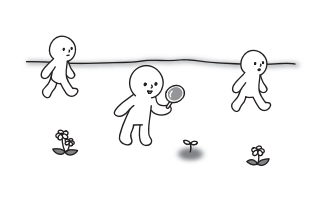Difference between revisions of "Making Opportunities/OG"
Jump to navigation
Jump to search
Opportunities for learning are created, not something that you chance upon or wait for.
***
▼In this context
▼Therefore
Sfrancisco (talk | contribs) (Created pattern in original format) |
Sfrancisco (talk | contribs) m (Edited format) |
||
| (4 intermediate revisions by the same user not shown) | |||
| Line 4: | Line 4: | ||
{{Infobox_designpattern | {{Infobox_designpattern | ||
|image= <!-- Provide the filename of the image to be displayed (e.g., Design_pattern.png) --> | |image= <!-- Provide the filename of the image to be displayed (e.g., Design_pattern.png) --> | ||
|contributor= | |contributor= [[Takashi Iba]], [[ Mami Sakamoto]] | ||
|source= Iba & Sakamoto (2011)<ref>Iba, T., & Sakamoto, M. (2011). [http://dl.acm.org/citation.cfm?doid=2578903.2579166 Learning patterns III: a pattern language for creative learning]. In ''Proceedings of the 18th Conference on Pattern Languages of Programs | |source= Iba & Sakamoto (2011)<ref>Iba, T., & Sakamoto, M. (2011). [http://dl.acm.org/citation.cfm?doid=2578903.2579166 Learning patterns III: a pattern language for creative learning]. In ''Proceedings of the 18th Conference on Pattern Languages of Programs (PLoP 2011)'' (p. 29). New York:ACM.</ref> | ||
|dataanalysis= <!-- If applicable, list of data analyses used for mining the pattern separated by a " , "comma --> | |dataanalysis= <!-- If applicable, list of data analyses used for mining the pattern separated by a " , "comma --> | ||
|domain= <!-- Learning domain the design pattern belongs to (e.g., General, Math, Algebra) --> | |domain= <!-- Learning domain the design pattern belongs to (e.g., General, Math, Algebra) --> | ||
| Line 20: | Line 20: | ||
[[File:Making Opportunities-OG.png|center|400px]] | [[File:Making Opportunities-OG.png|center|400px]] | ||
'' | ''“A wise man will make more opportunities than he finds.”— Francis Bacon'' | ||
'' | ''“In the fields of observation chance favors only the prepared mind.” — Louis Pasteur'' | ||
'' | ''“Action is the foundational key to all success.” — Pablo Picasso'' | ||
| Line 55: | Line 55: | ||
<references/> | <references/> | ||
[[Category:Design_patterns]] <!-- List of other categories the design pattern belongs to. The syntax for linking to a category is: [[Category:<Name of category]] --> | [[Category:Design_patterns]] [[Category:Full_Pattern]] [[Category:Creative Education Patterns]] [[Category:Traditional Classroom]]<!-- List of other categories the design pattern belongs to. The syntax for linking to a category is: [[Category:<Name of category]] --> | ||
Latest revision as of 21:28, 5 June 2017
| Making Opportunities | |
| Contributors | Takashi Iba, Mami Sakamoto |
|---|---|
| Last modification | June 5, 2017 |
| Source | Iba & Sakamoto (2011)[1] |
| Pattern formats | OPR Alexandrian |
| Usability | |
| Learning domain | |
| Stakeholders | |
“A wise man will make more opportunities than he finds.”— Francis Bacon
“In the fields of observation chance favors only the prepared mind.” — Louis Pasteur
“Action is the foundational key to all success.” — Pablo Picasso
You are ready to learn, perhaps having some expectations for opportunities for learning.
There are few good opportunities for learning compared with your expectations.
- • Given opportunities are not always suitable for you.
- • It is not easy to notice what is not there.
Make opportunities for learning by yourself, based on your interests.
- • Consider your interests, and specify the knowledge and skills that you want / need to learn.
- • Seek the information related to your needs, and explore the way of learning.
- • Set yourself in the environment to start learning, for example taking a course, joining the project, or buying the books.
References
- ↑ Iba, T., & Sakamoto, M. (2011). Learning patterns III: a pattern language for creative learning. In Proceedings of the 18th Conference on Pattern Languages of Programs (PLoP 2011) (p. 29). New York:ACM.
